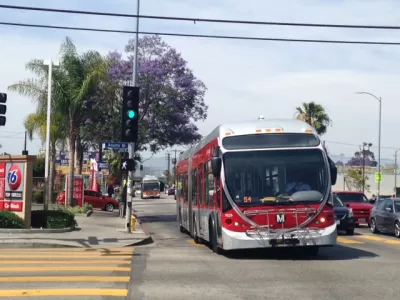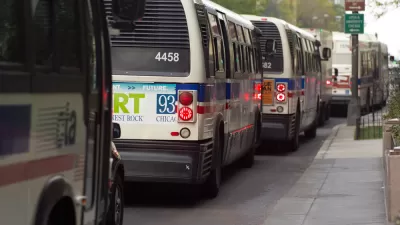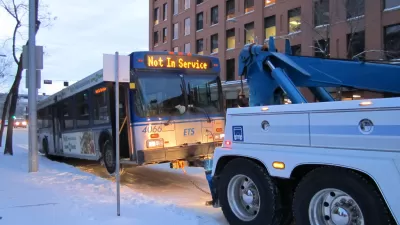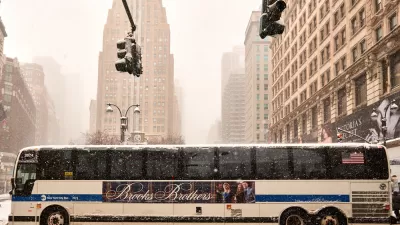The news about the decline of bus ridership around the country is making the rounds again. The future of bus transit as we know it seems to be in question.

David Harrison was the first to raise the alarms about declining bus ridership in August, with an article headlined by concern for the threat of declining ridership to the future of transit systems. "A staple of American urban life—the city bus—is in a state of steady decline," writes Harrison in the lede for the Wall Street Journal, which might be behind a paywall for some readers.
Leah Binkovitz followed that article with coverage for The Urban Edge that will be more accessible that the Wall Street Journal, tying the narrative back to the experience in Houston, which has proven to be an outlier after a bus system redesign in 2015.
Jeff Spross also followed up on the Wall Street Journal article. Here's Spross's take on the situation with bus transit, summarized:
You might be inclined to ask, so what? There are still subways, and people have cars. But the struggles of city buses are actually a microcosm for the full sweep of America's economic dysfunction. And like many parts of the economy, it never truly recovered from the Great Recession.
Another article from this month provides a local case study for the decline in bus ridership. Yonah Freemark wrote for Streetsblog USA of Los Angeles' declining bus ridership in a time of massive expansion of the regional rail system. That decline is placed in context of a popular narrative about Los Angeles achieving some kind of public transit enlightenment. The truth, according to Freemark, "is a little less dramatic," because "L.A.’s transit service was never that bad, while its purported transit renaissance has yet to translate into more people opting for buses and trains." The article includes an in-depth critique of the Los Angeles County Metropolitan Transportation Authority (Metro) transit system.
Planetizen's ongoing coverage of bus ridership last saw a crest in early 2017, when bus ridership data showed declines in Los Angeles and Tampa Bay, and transit ridership declined (rail included) in Washington, D.C. and Denver.
FULL STORY: America’s Buses Lose Riders, Imperiling Their Future

Alabama: Trump Terminates Settlements for Black Communities Harmed By Raw Sewage
Trump deemed the landmark civil rights agreement “illegal DEI and environmental justice policy.”

Planetizen Federal Action Tracker
A weekly monitor of how Trump’s orders and actions are impacting planners and planning in America.

The 120 Year Old Tiny Home Villages That Sheltered San Francisco’s Earthquake Refugees
More than a century ago, San Francisco mobilized to house thousands of residents displaced by the 1906 earthquake. Could their strategy offer a model for the present?

Indy Neighborhood Group Builds Temporary Multi-Use Path
Community members, aided in part by funding from the city, repurposed a vehicle lane to create a protected bike and pedestrian path for the summer season.

Congestion Pricing Drops Holland Tunnel Delays by 65 Percent
New York City’s contentious tolling program has yielded improved traffic and roughly $100 million in revenue for the MTA.

In Both Crashes and Crime, Public Transportation is Far Safer than Driving
Contrary to popular assumptions, public transportation has far lower crash and crime rates than automobile travel. For safer communities, improve and encourage transit travel.
Urban Design for Planners 1: Software Tools
This six-course series explores essential urban design concepts using open source software and equips planners with the tools they need to participate fully in the urban design process.
Planning for Universal Design
Learn the tools for implementing Universal Design in planning regulations.
Clanton & Associates, Inc.
Jessamine County Fiscal Court
Institute for Housing and Urban Development Studies (IHS)
City of Grandview
Harvard GSD Executive Education
Toledo-Lucas County Plan Commissions
Salt Lake City
NYU Wagner Graduate School of Public Service





























